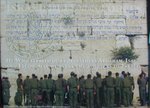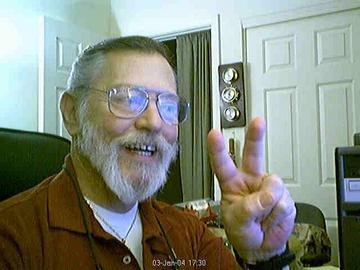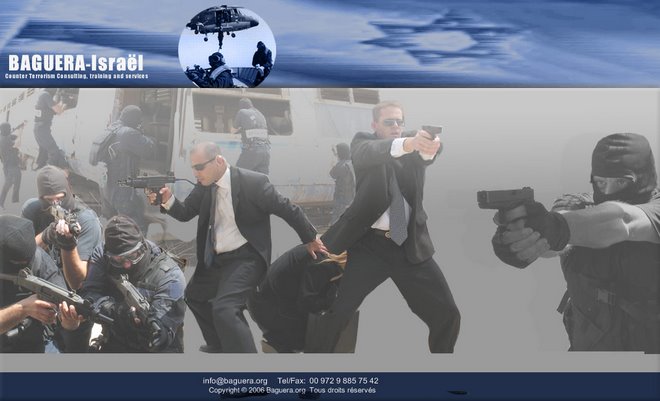Set Your Watch with B'nai Elim Jerusalem Time
Jerusalem On Line - Channel 2 News from Israel
UN Doomsday Treaty With Ginny Simone
07 November 2008
To Barak Hussein from Baschar al-Assad
A threat, an apology, and an invitation
Washington - Nov. 6, 2008 (RPS Blog) -- A hackacademic, close to the Assad regime, just published a paper in Asia Time Online in which he places nine different Syrian conditions to invite President Barack Obama to Syria. One of the conditions is an apology by the US for the raid to stop an al-Qaeda operative Assad has refused to stop inside Syrian territories. The piece is intended, indirectly, to tell President Obama that if you do not comply with our conditions, we will continue on the path of terror.
There is something sickening about the piece that we wished we did not advertise but then without it, how could anyone understand how the thuggish Assad regime thinks and operates.
The piece does not mention the thousands of innocent Iraqis and American servicemen who died at the hands of the writer's boss and the Iranian Mullahs. Nor does it mention what Syria will do about its sponsorship of terror. Assad would love nothing more than to "contain" Hezbollah and Hamas temporarily to fight another day.
What the author also fails to understand is what and how the US operates. The Assad regime truly believes that if Robert Malley visited Syria and talked to Assad, then he would be able to jump through the many impediments anyone must jump through to keep his promises. They still do not get this country and the intelligence services of the US want nothing more than to give the wrong advice to keep the Assad regime always off-balance.
The US is a country of institutions that changed in a radical way after 9/11. What worked pre 9/11 does not work in post 9/11. Maybe another raid on Assad, if he continues facilitating terror against Iraqis, will change his mind permanently. The logic being "If Obama can strike then I have no hope but to stop terror". Without this strike, Assad will continue challenging the international community and will keep his finger on the terror button just in case.
Abu Hussein's invitation to Damascus
Sami Mobayed
DAMASCUS - In the Muslim world, men take pride in their first born baby boy and they are often called "the father of X" for the remainder of their lives. In turn, first born boys are named after their grandfathers, and this explains why Syrians affectionately call Barack Obama "Abu Hussein" (father of Hussein).He does not have a baby boy - just two beautiful girls - yet that doesn't really matter for the overwhelmed Syrians who woke up to hear the news coming in from Washington on November 5 that Barack Hussein Obama had become the 44th president of the United States.
As far as they are concerned, his father's name is Hussein and when Obama gets a baby boy, he is going to call him Hussein. That is the tradition in the Muslim world after all, and Obama comes from Muslim lineage in Kenya. Gamal Abdul-Nasser of Egypt was "Abu Khaled", Hezbollah leader Hassan Nasrallah is "Abu Hadi", Palestinian Liberation Organization head Yasser Arafat was "Abu Ammar" and for masses in the Arab world, Barack Obama is "Abu Hussein".This terminology was coined by ordinary Syrians who watched the presidential race with enthusiasm glad to see the end of President George W Bush.All the same, Syrians have no illusions that the president-elect is going to be a savior for the Arabs.
They hope that he will be more fair and even-handed when it comes to the Arab-Israeli conflict, and end the tension that started between Damascus and Washington under the Bush administration. They realize, however, that his election shows just how far America has come in terms of racial equality, and everybody in Damascus - young and old - is impressed.In August, hosted by an American organization called Search for Common Ground, three Syrians went to Washington and met with think-tanks, newspapers and loyalists of Obama, discussing ways to move bilateral relations forward once Bush leaves the White House.
For the past 12 months, Damascus has welcomed a wide array of US officials who are either members of the Obama team or supporters of the new president. All of them came carrying a similar message: The policy of no dialogue with Damascus under Bush has been unproductive for the region and the United States. That is going to change, they said, when Obama reaches the White House.All of them were warmly received by the Syrians, at a popular and official level, including former ambassador Daniel Kurtzer and former national security advisor under president Jimmy Carter, Zbigniew Brzezinski. The latter even spoke to students at one of the new private universities in Syria, who applauded strongly whenever he mentioned "President Obama".Syrians were especially thrilled when Obama refused to praise the US strike on Syria in October, unlike his Republican opponent Senator John McCain.
Syrian dailies and magazines have been running front page news of Obama - almost neglecting McCain.Officially, Syria is yet to comment on Obama's victory and President Bashar al-Assad was often quoted during the presidential race as saying that Syria would wait to see the position of winner towards the Middle East once he reached the White House.Syria was worried at Obama's strong support for Israel - although it came as no surprise - during his visit to Tel Aviv some months ago.
They have not forgotten the overwhelming support Arabs showed for George W Bush in 2000, thinking that he would be a much better president for the Arabs than Al Gore. Therefore, officially, it is still a wait-and-see policy, although there is universal unsaid conviction that McCain would have been an extension of Bush and at least Obama - a man who champions change - is going to be different.The Syrians are willing to cooperate with Obama on a variety of issues, prime on the list being Iraq. In the words of Syrian Foreign Minister Walid al-Mouallem, Syria will help secure an "honorable exit" for the US from Iraq. Damascus was very close to suspending diplomatic relations with Baghdad after Iraqi Prime Minister Nuri al-Maliki failed to prevent the October strike on Syria - which was launched from Iraqi territory - but did not do so, to keep channels open with the Obama administration and to better deliver security in Iraq.
Syrian troop numbers have been reduced at the border, but not withdrawn completely, in objection to the raid, but security coordination with Baghdad (at a ministerial level) remains intact, to prevent jihadis from crossing the border into Iraq.If Obama sends off positive signals to Syria, troops can return to the Syrian-Iraqi border. Syria's newly appointed ambassador, Nawaf al-Fares, remains at his job in Baghdad, building bridges with Iraqi Sunnis (he hails from a prominent tribe that overlaps between Syria and Iraq). On the day of the Obama victory, Assad received a delegation sent to Damascus by Shi'ite leader Muqtada al-Sadr. Scores of Iraqi leaders - Shi'ite, Kurd and Sunni - have been coming to Syria for the past four years, meeting with Syrian officials who are trying to build bridges between warring factions to help normalize and stabilize Iraq.Syria can also still use its weight in the region to moderate the behavior of non-state players like Hezbollah in Lebanon and Hamas in Palestine, and find solutions for the US standoff with Iran over its nuclear program. What the Syrians are expecting 11 weeks from now when Obama is sworn in as president is the following:
Appointment of a US ambassador to Syria. The post has been vacant since Margaret Scooby was withdrawn when relations plummeted over Lebanon in 2005. This would be accompanied by greater room to maneuver for Syria's ambassador to the US, Imad Mustapha, who has been spurned by the Bush administration because of his criticism of how Bush treated Syria.
An end to the anti-Syrian rhetoric coming out of the White House and State Department since 2003. That would automatically reduce the anti-Syrian sentiment in the US media. Recognition of Syria's cooperation on border security with Iraq. Cooperation with Syria to deal with the 1.5 million Iraqi refugees in Syria.
Lifting - in due course - of the sanctions that were imposed on Damascus and abolishment of the Syrian Accountability Act.
Willingness to sponsor Syria's indirect peace talks with Israel, currently on hold in Turkey. That is something Bush curtly refused to do since the talks started in April 2008, claiming that Syria was more interested in a peace process than a peace treaty. Syria is sincere and the new White House must acknowledge that to deliver peaceful results in the Middle East.
American guarantees and willingness to serve as an honest broker could make the talks successful, the Syrians believe, transforming them from indirect to direct negotiations. Syria is determined to regain the occupied Golan Heights (taken by Israel during the Arab-Israeli war of 1967) and Obama must help Syria achieve that if he is sincere about change in the region.
Recognizing that no problems can be solved in the Middle East without Syria with regard to the Palestinians, Iraqis and Lebanese. Bush launched his famous "roadmap" for peace between Israel and Palestine, but bypassed the Syrians. If another roadmap were to be launched, Syria would have to be included.
Help Syria combat Islamic fundamentalism that has been flowing into its territory from north Lebanon and Iraq. The deadly September 27 attack in Damascus - which left nearly 40 Syrians dead and injured - should have been a wake-up call for the Americans that unless cooperation is forthcoming from the US, Syria might become a battleground for extremists, as in the 1980s. Intelligence cooperation and technical assistance with the Americans is needed to curb and combat this Islamic threat.
An apology, compensation and explanation for the air raid on Syria that left eight Syrian civilians dead in October 2008.
Help normalize relations between Syria and America on a people-to-people level, which have been strained since Bush came to power in 2001. That would include giving visas to Syrians wanting to study or work in the US
When all this is done, Syria would be willing to open its arms to Abu Hussein, receiving him perhaps as a guest of honor in Damascus, the way it did with Jimmy Carter and Bill Clinton.
Washington - Nov. 6, 2008 (RPS Blog) -- A hackacademic, close to the Assad regime, just published a paper in Asia Time Online in which he places nine different Syrian conditions to invite President Barack Obama to Syria. One of the conditions is an apology by the US for the raid to stop an al-Qaeda operative Assad has refused to stop inside Syrian territories. The piece is intended, indirectly, to tell President Obama that if you do not comply with our conditions, we will continue on the path of terror.
There is something sickening about the piece that we wished we did not advertise but then without it, how could anyone understand how the thuggish Assad regime thinks and operates.
The piece does not mention the thousands of innocent Iraqis and American servicemen who died at the hands of the writer's boss and the Iranian Mullahs. Nor does it mention what Syria will do about its sponsorship of terror. Assad would love nothing more than to "contain" Hezbollah and Hamas temporarily to fight another day.
What the author also fails to understand is what and how the US operates. The Assad regime truly believes that if Robert Malley visited Syria and talked to Assad, then he would be able to jump through the many impediments anyone must jump through to keep his promises. They still do not get this country and the intelligence services of the US want nothing more than to give the wrong advice to keep the Assad regime always off-balance.
The US is a country of institutions that changed in a radical way after 9/11. What worked pre 9/11 does not work in post 9/11. Maybe another raid on Assad, if he continues facilitating terror against Iraqis, will change his mind permanently. The logic being "If Obama can strike then I have no hope but to stop terror". Without this strike, Assad will continue challenging the international community and will keep his finger on the terror button just in case.
Abu Hussein's invitation to Damascus
Sami Mobayed
DAMASCUS - In the Muslim world, men take pride in their first born baby boy and they are often called "the father of X" for the remainder of their lives. In turn, first born boys are named after their grandfathers, and this explains why Syrians affectionately call Barack Obama "Abu Hussein" (father of Hussein).He does not have a baby boy - just two beautiful girls - yet that doesn't really matter for the overwhelmed Syrians who woke up to hear the news coming in from Washington on November 5 that Barack Hussein Obama had become the 44th president of the United States.
As far as they are concerned, his father's name is Hussein and when Obama gets a baby boy, he is going to call him Hussein. That is the tradition in the Muslim world after all, and Obama comes from Muslim lineage in Kenya. Gamal Abdul-Nasser of Egypt was "Abu Khaled", Hezbollah leader Hassan Nasrallah is "Abu Hadi", Palestinian Liberation Organization head Yasser Arafat was "Abu Ammar" and for masses in the Arab world, Barack Obama is "Abu Hussein".This terminology was coined by ordinary Syrians who watched the presidential race with enthusiasm glad to see the end of President George W Bush.All the same, Syrians have no illusions that the president-elect is going to be a savior for the Arabs.
They hope that he will be more fair and even-handed when it comes to the Arab-Israeli conflict, and end the tension that started between Damascus and Washington under the Bush administration. They realize, however, that his election shows just how far America has come in terms of racial equality, and everybody in Damascus - young and old - is impressed.In August, hosted by an American organization called Search for Common Ground, three Syrians went to Washington and met with think-tanks, newspapers and loyalists of Obama, discussing ways to move bilateral relations forward once Bush leaves the White House.
For the past 12 months, Damascus has welcomed a wide array of US officials who are either members of the Obama team or supporters of the new president. All of them came carrying a similar message: The policy of no dialogue with Damascus under Bush has been unproductive for the region and the United States. That is going to change, they said, when Obama reaches the White House.All of them were warmly received by the Syrians, at a popular and official level, including former ambassador Daniel Kurtzer and former national security advisor under president Jimmy Carter, Zbigniew Brzezinski. The latter even spoke to students at one of the new private universities in Syria, who applauded strongly whenever he mentioned "President Obama".Syrians were especially thrilled when Obama refused to praise the US strike on Syria in October, unlike his Republican opponent Senator John McCain.
Syrian dailies and magazines have been running front page news of Obama - almost neglecting McCain.Officially, Syria is yet to comment on Obama's victory and President Bashar al-Assad was often quoted during the presidential race as saying that Syria would wait to see the position of winner towards the Middle East once he reached the White House.Syria was worried at Obama's strong support for Israel - although it came as no surprise - during his visit to Tel Aviv some months ago.
They have not forgotten the overwhelming support Arabs showed for George W Bush in 2000, thinking that he would be a much better president for the Arabs than Al Gore. Therefore, officially, it is still a wait-and-see policy, although there is universal unsaid conviction that McCain would have been an extension of Bush and at least Obama - a man who champions change - is going to be different.The Syrians are willing to cooperate with Obama on a variety of issues, prime on the list being Iraq. In the words of Syrian Foreign Minister Walid al-Mouallem, Syria will help secure an "honorable exit" for the US from Iraq. Damascus was very close to suspending diplomatic relations with Baghdad after Iraqi Prime Minister Nuri al-Maliki failed to prevent the October strike on Syria - which was launched from Iraqi territory - but did not do so, to keep channels open with the Obama administration and to better deliver security in Iraq.
Syrian troop numbers have been reduced at the border, but not withdrawn completely, in objection to the raid, but security coordination with Baghdad (at a ministerial level) remains intact, to prevent jihadis from crossing the border into Iraq.If Obama sends off positive signals to Syria, troops can return to the Syrian-Iraqi border. Syria's newly appointed ambassador, Nawaf al-Fares, remains at his job in Baghdad, building bridges with Iraqi Sunnis (he hails from a prominent tribe that overlaps between Syria and Iraq). On the day of the Obama victory, Assad received a delegation sent to Damascus by Shi'ite leader Muqtada al-Sadr. Scores of Iraqi leaders - Shi'ite, Kurd and Sunni - have been coming to Syria for the past four years, meeting with Syrian officials who are trying to build bridges between warring factions to help normalize and stabilize Iraq.Syria can also still use its weight in the region to moderate the behavior of non-state players like Hezbollah in Lebanon and Hamas in Palestine, and find solutions for the US standoff with Iran over its nuclear program. What the Syrians are expecting 11 weeks from now when Obama is sworn in as president is the following:
Appointment of a US ambassador to Syria. The post has been vacant since Margaret Scooby was withdrawn when relations plummeted over Lebanon in 2005. This would be accompanied by greater room to maneuver for Syria's ambassador to the US, Imad Mustapha, who has been spurned by the Bush administration because of his criticism of how Bush treated Syria.
An end to the anti-Syrian rhetoric coming out of the White House and State Department since 2003. That would automatically reduce the anti-Syrian sentiment in the US media. Recognition of Syria's cooperation on border security with Iraq. Cooperation with Syria to deal with the 1.5 million Iraqi refugees in Syria.
Lifting - in due course - of the sanctions that were imposed on Damascus and abolishment of the Syrian Accountability Act.
Willingness to sponsor Syria's indirect peace talks with Israel, currently on hold in Turkey. That is something Bush curtly refused to do since the talks started in April 2008, claiming that Syria was more interested in a peace process than a peace treaty. Syria is sincere and the new White House must acknowledge that to deliver peaceful results in the Middle East.
American guarantees and willingness to serve as an honest broker could make the talks successful, the Syrians believe, transforming them from indirect to direct negotiations. Syria is determined to regain the occupied Golan Heights (taken by Israel during the Arab-Israeli war of 1967) and Obama must help Syria achieve that if he is sincere about change in the region.
Recognizing that no problems can be solved in the Middle East without Syria with regard to the Palestinians, Iraqis and Lebanese. Bush launched his famous "roadmap" for peace between Israel and Palestine, but bypassed the Syrians. If another roadmap were to be launched, Syria would have to be included.
Help Syria combat Islamic fundamentalism that has been flowing into its territory from north Lebanon and Iraq. The deadly September 27 attack in Damascus - which left nearly 40 Syrians dead and injured - should have been a wake-up call for the Americans that unless cooperation is forthcoming from the US, Syria might become a battleground for extremists, as in the 1980s. Intelligence cooperation and technical assistance with the Americans is needed to curb and combat this Islamic threat.
An apology, compensation and explanation for the air raid on Syria that left eight Syrian civilians dead in October 2008.
Help normalize relations between Syria and America on a people-to-people level, which have been strained since Bush came to power in 2001. That would include giving visas to Syrians wanting to study or work in the US
When all this is done, Syria would be willing to open its arms to Abu Hussein, receiving him perhaps as a guest of honor in Damascus, the way it did with Jimmy Carter and Bill Clinton.
Subscribe to:
Post Comments (Atom)
Colonel Richard Kemp, British Army - Comment on the IDF's Actions in Gaza
Radical Islams Plans for Western Civilization
THE THIRD JIHAD - WATCH THIS IMPORTANT FILM NOW - FREE
Obama's true agenda...Throw Israel Under the Bus
****Regarding Obama’s Speech before the U.N. Obama has surpassed the peanut farmer Jimmy Carter as the worst and most anti-Israel, anti-Semitic, Arabist President who has ever occupied the White House. Not only is he is a narcissistic moron who is dragging America into an abyss; Obama is the most dangerous threat to World Freedom, Liberty and Western Civilization since Hitler. (Blogmaster)
Senator Joe Leiberman 'Islamist Extremist Regime'
JOHN VOIGHT ON OBAMA'S DISTAIN FOR ISRAEL
CHAZAK CHAZAK
ON THE PATH TO MUSLIM DOMINATION - REVERSABLE? STOPPABLE?
2 STATE SOLUTION - COMMENTARY BY THE "18"
A message to the Jewish people and the entire world
Chronicles I - 16:15-18: "Forever remember His covenant that he commanded forever; That He made with Abraham and swore to Isaac; and confirmed in a decree for Jacob, for Israel, as an eternal covenant; saying to You I will give the Land of Cannan as your alloted heritage"
































 While doing IDF (Israel Defence Forces) reserve duty on a mountain overlooking the
While doing IDF (Israel Defence Forces) reserve duty on a mountain overlooking the 





No comments:
Post a Comment